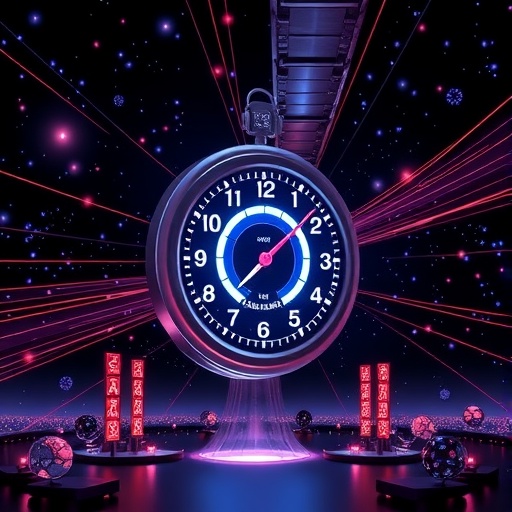In a remarkable advancement merging the abstract realm of mathematics with the concrete realm of timekeeping, scientists at King’s College London have formulated a groundbreaking set of mathematical equations capable of transforming any sequence of seemingly random events into a precise clock. This revelation not only challenges conventional wisdom about time measurement but also holds promise for diverse applications ranging from cellular biology to quantum physics.
Traditional clocks, such as wristwatches, rely on consistent periodic motions—ticks occurring at regular, predictable intervals—to mark the passage of time. However, many natural phenomena do not conform to such orderly rhythms. Instead, they unfold as sequences of irregular, unpredictable events. The team at King’s College has demonstrated that even these stochastic processes can serve as reliable timers by leveraging the inherent statistical properties of the events’ intervals.
A fundamental concept underpinning this breakthrough is the idea of Markovian processes—systems where the probability of each event depends solely on the immediately preceding event, with no memory of the distant past. Markovian processes are ubiquitous in nature, manifesting in examples ranging from the fluctuations of stock market prices to the irregular beating of a human heart. By carefully analyzing the timing and frequency of these random “jumps,” the researchers have formalized methods to estimate elapsed time with unprecedented accuracy.
The core of the discovery lies in establishing strict mathematical bounds on how precisely a clock built from Markovian events can measure time. This bound represents the absolute classical limit to accuracy when relying on memoryless stochastic processes within the framework of classical physics. If a real-world clock exhibits timekeeping that surpasses this limit, it suggests the presence of fundamentally different underlying dynamics—namely, quantum mechanical effects.
Quantum clocks, such as atomic clocks based on transitions of electrons at the quantum scale, are famously capable of surpassing the precision limits dictated by classical physics. The King’s College findings provide a theoretical framework that explains why classical clocks cannot compete with their quantum counterparts, reinforcing the profound impact of quantum phenomena on the nature of time measurement.
Dr. Mark Mitchison, lead author and Proleptic Senior Lecturer in the Department of Physics at King’s College London, articulated the philosophical origins and practical implications of their research. He explained that the motivation was to distill the quintessential components necessary to build a clock under any circumstances—even in isolation from conventional instruments. By counting irregular, random events around oneself, whether the ebb and flow of ocean waves or the irregular beats of a heart, one could construct the best possible classical clock available.
These insights extend far beyond abstract theory. The team envisions applications in understanding how biological systems orchestrate orderly functions amidst noisy, fluctuating environments. Motor proteins such as kinesin, which “walk” along cellular microtubules transporting vital materials, transform chaotic thermal fluctuations into highly regular, directed movements. Such molecular machines act as natural clocks, their rhythmic stepping crucial to cellular health and implicated in diseases like motor neurone disease when malfunctioning.
Reinterpreting molecular biological processes as clocks offers a fresh lens through which to view the emergence of order from chaos in living systems. Not only does this approach provide rigorous mathematical tools for characterizing biological timekeeping, but it also bridges scales—from microscopic molecular motors to macroscopic ecosystems—where spontaneous generation of temporal order is essential.
Importantly, this breakthrough also touches on deep, unresolved mysteries at the heart of physics. The unidirectional flow of time, our incapacity to recall the future, and the debate over whether time itself is quantized akin to energy are questions that challenge our fundamental understanding of reality. By demarcating what classical clocks can achieve and highlighting how quantum clocks defy those bounds, the researchers hope their work will catalyze new insights into these profound enigmas.
Furthermore, the mathematical formalism developed may enable experimentalists to identify quantum effects by scrutinizing deviations from classical Markovian predictions. In other words, by closely measuring timekeeping performance in a system and comparing it to the classical limits, researchers could detect the “signature” of quantum behavior seeping into macroscopic phenomena.
This fusion of abstract mathematics, classical physics, and quantum theory not only revitalizes our conception of time but also holds transformative potential for technologies reliant on precise time measurement. Atomic clocks, which underpin global positioning systems (GPS), telecommunications, and fundamental tests of physics, exemplify how quantum-enabled precision reshapes technological horizons.
As Dr. Mitchison concluded, contemplating time through the prism of clocks built on random events, whether classical or quantum, may finally illuminate the essence of temporal flow itself. Their work charts a path toward uniting the practicalities of measurement with the philosophical and physical complexities of time—perhaps eventually answering why time marches irreversibly forward and whether it is composed of indivisible units.
By threading the needle between stochastic randomness and deterministic order, this research breathes new life into the age-old quest of defining time, anchoring it in the rhythms of nature’s randomness rather than solely in engineered mechanical regularity. The mathematical tools developed by King’s College physicists thus represent a landmark achievement with ramifications echoing from biology to quantum technology, and from practical timekeeping to the very fabric of space-time.
Subject of Research:
Mathematical frameworks for measuring time using stochastic Markovian processes; classical versus quantum limits of clock accuracy.
Article Title:
New Mathematical Equations Enable Precise Clocks from Random Events, Challenging Classical Limits
News Publication Date:
Not specified in the source content.
Web References:
Not provided.
References:
Published in Physical Review X.
Image Credits:
Not provided.
Keywords
Quantum mechanics, physics, mechanics, physical sciences, theoretical physics




